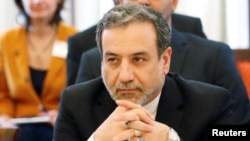Iran's new president presented his cabinet to parliament on Sunday for a vote of confidence, state media reported, proposing seasoned pragmatic diplomat Abbas Araqchi as foreign minister at a time of heightened regional tensions.
President Masoud Pezeshkian is shaping his cabinet at a time of an increased risk of escalation of the conflict in Gaza into a broader regional war, after the recent killings of Palestinian Islamist group Hamas' leader Ismail Haniyeh in Iran and of Hezbollah military commander Fuad Shukr in Beirut drew threats of retaliation against Israel.
Following the death of hardline President Ebrahim Raisi in a helicopter crash in May, Pezeshkian won a snap election last month by promising to improve ties with the world, promoting a pragmatic foreign policy, and to ease social restrictions at home.
Pezeshkian's proposed cabinet lineup requires lawmakers' approval and parliament speaker Mohammad Baqer Qalibaf said that parliamentary commissions will start reviewing his candidates on Monday.
Araqchi, 61, who was Iran's ambassador to several countries, including Japan, played a key role in negotiating Tehran's 2015 nuclear agreement with six world powers, which then-U.S. President Donald Trump exited in 2018 and re-imposed sanctions on Iran.
Araqchi later led Iran's negotiators during multilateral efforts - ultimately unsuccessful - to revive the pact via indirect diplomacy with Washington before he was replaced by hardline Ali Bagheri Kani in 2021.
The president's powers are limited in the Islamic Republic by those of the Supreme Leader, who is commander-in-chief of the armed forces, appoints the head of the judiciary and has the last say on major policies.
Tensions between Iran and the West have increased over Tehran's fast-advancing nuclear program and its threats to "harshly punish" Israel over the assassination of Haniyeh.
Tehran and Hamas accuse Israel of carrying it out, though it has not claimed or denied responsibility for the killing.
Separately, Iran's president nominated Mohsen Paknezhad as oil minister, who has served as deputy oil minister overseeing hydrocarbon resources between 2018 and 2021.
Pezeshkian has also nominated Farzaneh Sadeq as the road and transportation minister. If approved by the parliament, she would become only the second woman cabinet minister in the Islamic Republic's history.
The first one was appointed in 2009 by hardliner Mahmoud Ahmadinejad who was president at the time.
Under the president's proposed lineup Raisi's Intelligence Minister Esmail Khatib would keep his position in the new cabinet.





